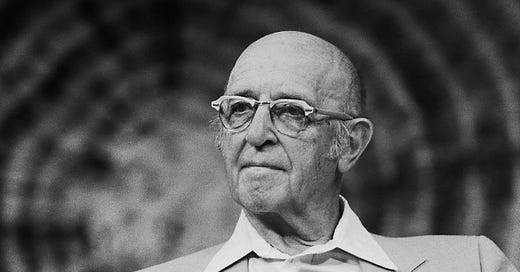Carl Rogers on Changing and Healing Through Connection
12 bits of wisdom to deepen your Valentine's Day.
Carl Rogers (1902-1987) is among the most influential psychologists in history. Best known for developing person-centered psychotherapy,1 Rogers didn’t just transform psychotherapy, he helped make it a science.
For those of us who love relationship science, there may be no wisdom as profound as that provided by Carl Rogers. His thoughts on changing and healing through connection may be the best Valentine’s Day gift of all — regardless of our relationship status:)
Good communication, free communication, within or between [people], is always therapeutic.
To put it briefly, a person is most lonely when he has dropped something of [their] outer shell or façade—the face with which he has been meeting the world—and feels sure that no one can understand, accept, or care for the part of [their] inner self that lies revealed.
If I let myself really understand another person, I might be changed by that understanding. And we all fear change. So as I say, it is not an easy thing to permit oneself to understand an individual
I have come to recognize that being trustworthy does not demand that I be rigidly consistent but that I be dependably real.
The major barrier to mutual interpersonal communication is our very natural tendency to judge, to evaluate, to approve or disapprove, the statement of the other person, or the other group.
Acceptance does not mean much until it involves understanding. It is only as I understand the feelings and thoughts which seem so horrible to you, or so weak, or so sentimental, or so bizarre—it is only as I see them as you see them, and accept them and you, that you feel really free to explore all the hidden nooks and frightening crannies of your inner and often buried experience.
If I accept the other person as something fixed, already diagnosed and classified, already shaped by [their] past, then I am doing my part to confirm this limited hypothesis. If I accept [them] as a process of becoming, then I am doing what I can to confirm or make real [their] potentialities.
To recognize that “I am the one who chooses” and “I am the one who determines the value of an experience for me” is both an invigorating and a frightening realization.
Thus scientific methodology is seen for what it truly is — a way of preventing me from deceiving myself in regard to my creatively formed subjective hunches which have developed out of the relationship between me and my material.
To understand another person’s thoughts and feelings thoroughly, with the meanings they have for [them], and to be thoroughly understood by the other person in return — this is one of the most rewarding of human experiences, and all too rare.
One of the most satisfying feelings I know—and also one of the most growth-promoting experiences for the other person—comes from my appreciating this individual in the same way that I appreciate a sunset. People are just as wonderful as sunsets if I can let them be. In fact, perhaps the reason we can truly appreciate a sunset is that we cannot control it.
The strongest force in our universe is not overriding power, but love.
Which quote resonated most strongly for you? Which helped you feel most optimistic about connecting to yourself and to others?
This post is free to read for all. Please share it!
It’s fair to wonder who exactly was at the center of the therapy before Rogers came up with “person-centered psychotherapy.”





#1, #4 and #12 especially speak to me today, but all of them are wonderful. Last night I actually engaged in some free communication about being dependably real, so #1 and #4 are super timely. Thank you for this!
This is so beautiful and true. We are terrified to reveal the innermost parts of ourselves for fear of being judged. As a coach, I particularly resonated with this statement. “If I accept the other person as something fixed, already diagnosed and classified, already shaped by [their] past, then I am doing my part to confirm this limited hypothesis.” I think this is what most of the world does.